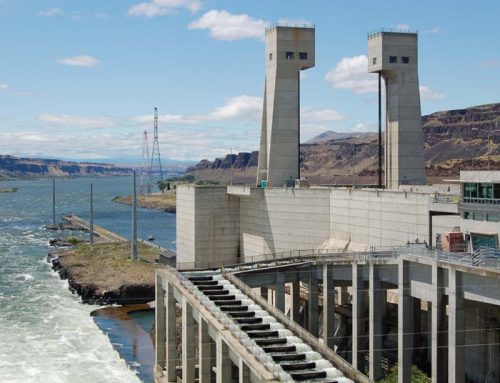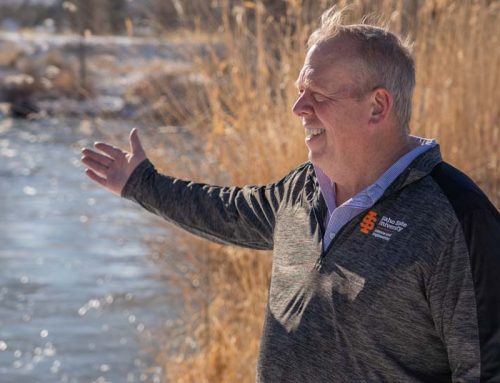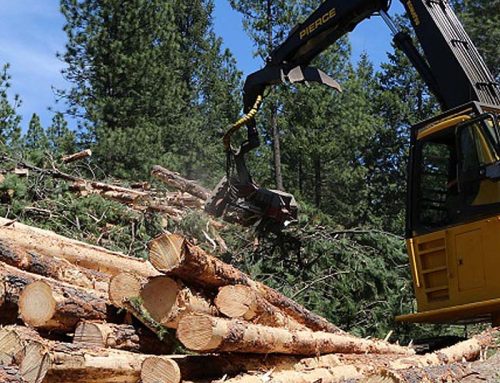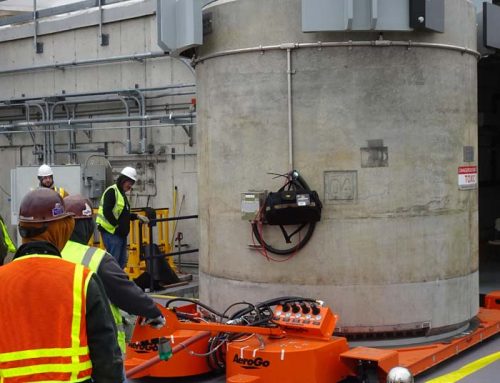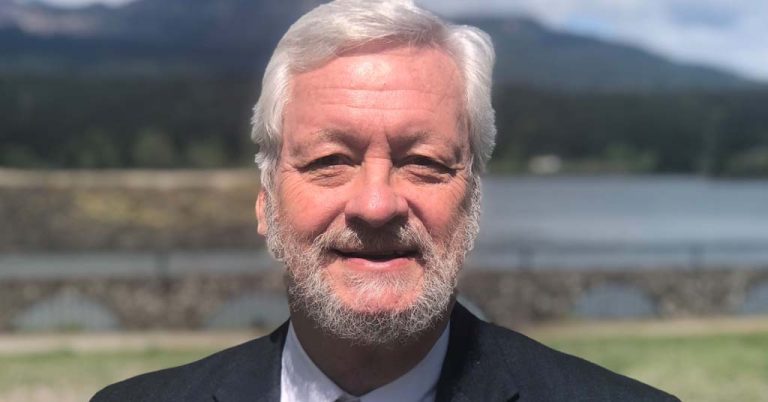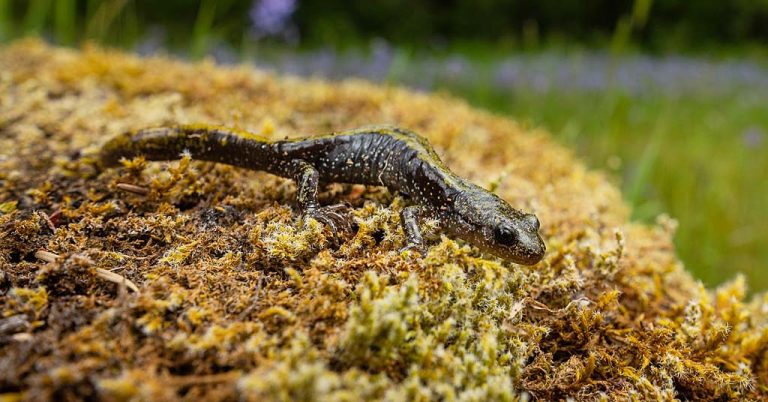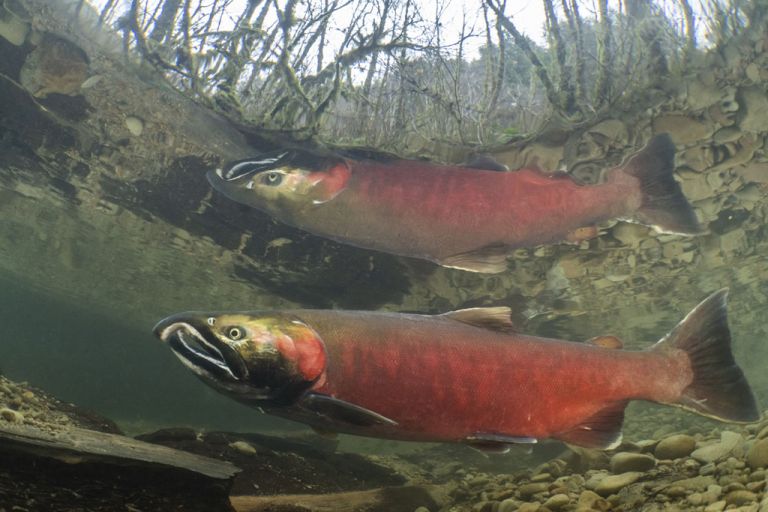Ballot Initiative 2117 would repeal the state’s groundbreaking climate law—and cut off funds for public land and water restoration

Let it go: Like this oil refinery in Anacortes framed by Mount Baker, Washington polluters are currently regulated by the state’s Climate Commitment Act. Photo: RVWithTito.com
UPDATE: According to the Washington Secretary of State’s office, with 100% of the Nov. 5, 2024, vote counted, voters defeated Initiative Measure No. 2117 by a margin of 61.74% to 38.26%. —Editor
By Nick Engelfried. October 17, 2024. On Sept. 22, volunteers with the Hood Canal Salmon Enhancement Group caught and released the 11,917th chum salmon the organization counted in the Union River this fall.
It was a moment to celebrate—this year set a new record for the most returning summer chum since 1974, as far back as reliable records go.
“It’s a really good example of how habitat restoration has impacted salmon in a positive way,” says Mendy Harlow, executive director of HCSEG.
In 2012 and 2013, HCSEG worked on a Hood Canal estuary restoration project that helped the summer chum rebound to a point where they may become the first-ever Pacific Northwest salmon run to be removed from the Endangered Species List.
Harlow hopes her organization and others can replicate this success in estuaries throughout Puget Sound over the next few years.
That is, if an initiative on the state ballot this November doesn’t cut off essential funding.
The Hood Canal Salmon Enhancement Group is one of dozens of nonprofits working to restore Washington public lands and waters that receive funding from the state’s Climate Commitment Act (CCA).
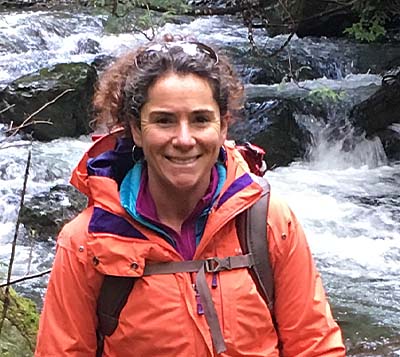
Mendy Harlow. Photo: HCSEG
The law, which was passed in 2021, isn’t primarily responsible for the return of summer chum to Union River. However, it has supercharged similar ecosystem restoration projects that promise to yield big dividends.
“Prior to the CCA we still did restoration work, but at a much smaller scale than now,” says Harlow. “We were mostly picking off low-hanging fruit, things like culvert replacements and small levy removals. Those projects are valuable, but just have a smaller impact than a large estuary restoration that requires a lot more money.”
In former times, conservation groups could only rarely undertake projects like the one on Union River, using money cobbled together from highly competitive grant programs.
Many potential projects never received funding they needed, with salmon and other species suffering.
The CCA, which is meant to make big polluters foot the bill for mitigating and adapting to climate change, put the completion of such projects much more within reach.
“Our annual budget for habitat restoration has increased significantly because of the CCA,” says Harlow. “That has real, positive impacts for salmon.”
Ballot Initiative 2117 would repeal the CCA, causing funding for much of HCSEG’s work to evaporate.
It would also prevent the legislature from enacting similar laws in the future. Dozens of energy efficiency, renewable energy, transit and habitat restoration projects would go on hold.
“We wouldn’t be able to continue our work at the level we’re doing today,” says Harlow. “That makes I-2117 a major threat.”
What is the Climate Commitment Act?
The Climate Commitment Act is the type of sweeping environmental legislation few states have passed.
Sometimes referred to as a “cap-and-invest” law, it established a statewide limit on carbon pollution from major sources, which are meant to gradually shrink in line with Washington’s goal of cutting emissions 95% below 1990 levels by 2050.
Polluting industries are given a finite number of carbon emission “allowances,” a percentage of which are auctioned to the highest bidder. Companies may sell and trade allowances among themselves, creating a market that incentivizes cutting emissions.
Money from allowance auctions goes to projects that hasten the clean energy transition or help landscapes adapt to climate change.
HCSEG’s work on Hood Canal belongs to this latter category.
“Warmer water harms salmon and other aquatic species,” says Harlow. “And in the Hood Canal area, we’ve watched temperatures increase dramatically because of climate change.”
Restoring estuaries and rivers can’t reverse climate trends. But it can help blunt their impact, for example by creating deep pools that serve as cool water refuges during heat waves.
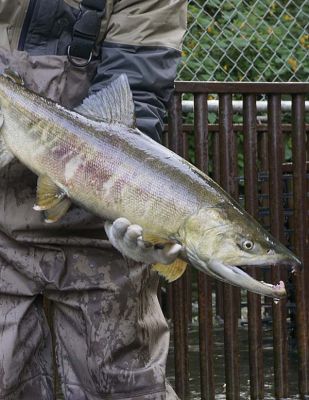
Helping hand: Summer chum salmon in Hood Canal were listed as threatened under the U.S. Endangered Species Act in 1999. Photo: Hood Canal Salmon Enhancement Group
The CCA’s passage, in 2021, capped off more than a decade of work by Washington Democratic legislators and environmental groups to implement a comprehensive climate law.
In 2018, climate activists tried to pass a ballot initiative that would have implemented a statewide carbon fee, which ultimately failed after the oil industry spent millions of dollars opposing it.
However, some key concepts from the initiative were incorporated into the Climate Commitment Act.
The CCA’s cap-and-invest approach is widely seen as more industry-friendly than a carbon fee, and was a compromise not all climate groups embraced initially. Yet, two years on from its passage, Washington’s environmental movement is virtually unanimous in opposing I-2117’s attempt to repeal the CCA.
Key to this growing enthusiasm for the law are provisions that carve out funds for projects affecting marginalized communities.
“There’s a really strong equity component built into the CCA,” says Seth Mangold, community engagement specialist for the Bellingham-based, environmental nonprofit RE Sources. “That’s partly why it’s so important.”
At least 35% of funds generated from the CCA go to projects in communities disproportionately impacted by pollution, while 10% is set aside for projects with support from Tribes.
The remaining money is distributed to a range of initiatives across the state.
The CCA will fund bicycle safety programs in Mansfield; a solar installation at Kalama Middle School; and a pumped energy storage feasibility study in Mossyrock. It will build a corridor of electric vehicle charging stations along I-5 and start transitioning Washington’s huge ferry fleet to run on electric engines.
However, some of the law’s biggest winners have been public lands and waters.
In 2023, the legislature allocated $83 million of CCA funds to conserve forests that store vast amounts of carbon, while many other CCA projects help restore salmon habitat.
Organizations wishing to benefit from CCA funds must go through a competitive grant-giving process, applying through state programs that may already have existed but are bolstered by the CCA.
“Whereas once a given program might have two or three million dollars available for projects throughout the state, now there might be nine or ten million available,” says Harlow. “It opens up a lot more possibilities for funding important work.”
Funding priorities questioned
Supporters of I-2117 are organized under the banner of Let’s Go Washington, an organization that also supports three other initiatives on the ballot this fall. They claim the Climate Commitment Act is ineffective.
“The CCA is using taxpayer dollars to fund federally mandated salmon restoration projects, they’re using minimal amounts of resources to protect the state from catastrophic wildfire ($12 million to programs that protect forests, $25 million to new government jobs), and most of the funds to pay for new government hires and planning groups,” Hallie Balch, director of communications for Let’s Go Washington, told Columbia Insight in an email. “All this to say, we certainly believe the projects are important and we believe that anyone else who believes we need to take action on our environment should be infuriated by the CCA.”
The oil industry has declined to throw its weight behind the repeal effort.
In addition to repealing the CCA, I-2117 would ban the state from passing similar policies in the future.
The initiative text states, “All state agencies are prohibited from implementing any type of carbon tax credit trading, also known as ‘cap and trade’ or ‘cap and tax’ scheme.”
However, the repeal of the CCA is far from certain.
That’s largely because I-2117 is up against a highly organized statewide movement to protect the billions of dollars now flowing into the green economy.
Opposing the repeal
On a typical weekend morning this fall, Seth Mangold can be found sitting at a meeting table in the RE Sources’ Bellingham office, handing stacks of leaflets to volunteers who signed up to canvass against I-2117. Each volunteer also gets a list of doors they’ll knock on in hopes of talking with voters.
“I’m really proud of the work we’ve done to reach people about the dangers of I-2117,” says Mangold. “We’ve been slowly building our volunteer capacity since August. Now it’s October and more people are paying more attention to the election, we’re ramping up.”
RE Sources is leading the charge against I-2117 in Whatcom County, and is part of a coalition of over 500 groups opposed to the initiative. These include environmental organizations, but also labor groups like the Certified Electrical Workers of Washington and healthcare organizations like the Washington State Medical Association.
Nineteen Tribes have also come out against the initiative, including the Tulalip, Nooksack, Nisqually, Suquamish and Quinault.
Mangold believes the broad-based support is partly thanks to a collaborative process that went into crafting the Climate Commitment Act, where environmental groups, unions and industry made compromises.
“There was a lot of long, thoughtful dialogue between stakeholders as this law was being written,” says Mangold.
This process of collaboration may also be why the oil industry has declined to throw its weight behind the CCA repeal effort.
Instead, the push to pass I-2117 has come mainly from a relatively small group of very wealthy individuals. Foremost among these is a newcomer to Washington politics who says he wants to make the state more friendly to business.
In support of I-2117
After supplying all the day’s volunteers with materials, Mangold heads out to knock on his own list of Whatcom County doors.
One of his favorite points to emphasize with the voters he talks to is who is primarily responsible for backing I-2117.
“For most people, as soon as they hear the initiative is bankrolled by a multimillionaire hedge fund manager, that’s enough to make them want to vote no,” says Mangold.
That multimillionaire is Brian Heywood, co-CEO of Taiyo Pacific Partners, an investment firm focused on Japanese and other Asian markets.
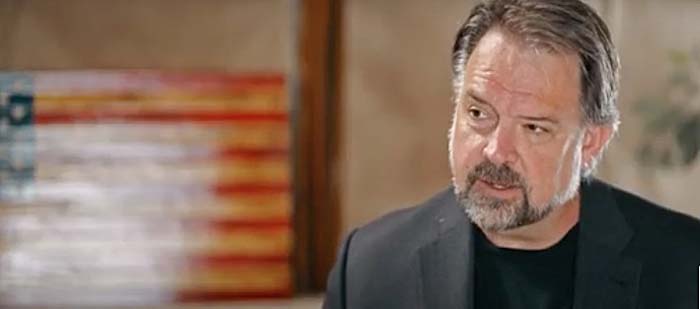
Brian Heywood. Screenshot: Let’s Go Washington
A California resident who says he moved to Washington to escape his former home state’s high taxes, Heywood sank millions of dollars of his own money into getting I-2117 and the other Let’s Go Washington initiatives on the ballot.
In addition to Heywood, Let’s Go Washington lists top donors that include the Building Industry Association of Washington, development company Kemper Holdings and Steve Gordon, a major Republican Party donor.
Its four initiatives all align with conservative priorities.
I-2109 would repeal Washington’s capital gains tax, which like the Climate Commitment Act was passed by the Democratic legislature in 2021. I-2124 would eliminate the state’s long-term care insurance program. I-2066 would limit local governments’ ability to reduce energy use in buildings.
All the Let’s Go Washington initiatives seek to limit spending on climate action, healthcare and other social programs.
These include projects that support ecosystem restoration like Hood Canal Salmon Enhancement Group’s work.
“We’ve made a lot of great headway in recent years toward recovering salmon populations,” says HCSEG’s Harlow. “Everyone wants to see that happen, and now CCA funding is helping make it possible. We need to ensure it continues.”


